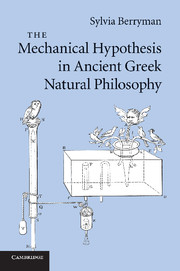Book contents
- Frontmatter
- Contents
- List of illustrations
- Acknowledgements
- Introduction
- 1 Mechanics and the mechanical: some problems of terminology
- 2 ‘Mechanistic’ thought before mechanics?
- 3 Mechanics in the fourth century
- 4 The theory and practice of ancient Greek mechanics
- 5 Ancient Greek mechanics continued: the case of pneumatics
- 6 The philosophical reception of mechanics in antiquity
- Conclusion
- Appendix: Ancient mechanics and the mechanical in the seventeenth century
- Bibliography
- Index of passages
- General index
1 - Mechanics and the mechanical: some problems of terminology
Published online by Cambridge University Press: 24 December 2009
- Frontmatter
- Contents
- List of illustrations
- Acknowledgements
- Introduction
- 1 Mechanics and the mechanical: some problems of terminology
- 2 ‘Mechanistic’ thought before mechanics?
- 3 Mechanics in the fourth century
- 4 The theory and practice of ancient Greek mechanics
- 5 Ancient Greek mechanics continued: the case of pneumatics
- 6 The philosophical reception of mechanics in antiquity
- Conclusion
- Appendix: Ancient mechanics and the mechanical in the seventeenth century
- Bibliography
- Index of passages
- General index
Summary
David Furley begins his work The Greek Cosmologists with a concise presentation of the differences between two main approaches to natural philosophy in antiquity. One of these, the teleological tradition, best represented by Aristotle, understands form to be explanatorily irreducible and holds that teleological explanations cannot be omitted from a complete account of the natural world. Philosophers in this tradition consider matter to be continuous and to have no imperceptible microstructure; they regard qualitative change as fundamental and not reducible to rearrangement of smallest parts; and they think of the material cosmos as structured and finite in extent. The atomists, by contrast, take all change to be fully explained by the spatial rearrangement of these smallest parts, without reference to any purposes these changes might be thought to serve. They take matter to be composed of indivisible smallest parts moving in a void, treat macroscopic structures as explanatorily reducible to the properties of the smallest parts and regard the universe as infinite and unstructured.
It is important to notice that the contrast between two competing approaches is not presented as a logically exhaustive dichotomy: neither in the ancient nor the modern world are these the only possible explanatory options. Furley's point is not simply to segregate philosophical positions according to an exhaustive and exclusive dichotomy, but to note an interesting tendency of philosophical positions to cluster around certain key assumptions.
- Type
- Chapter
- Information
- Publisher: Cambridge University PressPrint publication year: 2009



